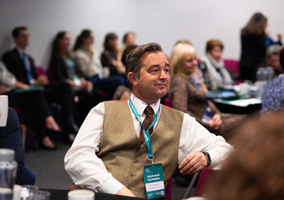Funders are “afraid to allocate funding to small charities” as they perceive them as being more likely to close, delegates at a recent conference heard.
Chloe Knott, manager of the UK Veterans Hearing Foundation (UKVHF), was speaking from her experience as the leader of a charity with 1.5 members of full-time equivalent staff.
“Funders are afraid to allocate funding to small charities from my experience, as they as they are unsure if we will survive,” she told delegates at the CIOF Convention yesterday.
Knott said that this results in smaller charities receiving short-term funding and that it can be “hard work” sourcing funds from a number of different trusts.
UKVHF reported a total income of £89,000 for the financial year ending April 2023 against an expenditure of £65,000.
New representative body for small charities needed
Knott said: “How are small charities expected to grow when we face such tough fundraising schemes?
“Small charities need to be recognised, especially when they are not in conflict and there is a need not being met already by a charity in the sector.
“Running a small charity myself, I'd like to see a change – a more supportive system to help us improve how we fundraise and more reassurance that small charities will be given a chance to thrive and help people who need our support.”
Knott was speaking on a panel alongside Gary Beharrell, regional manager of Lloyds Bank Foundation for England and Wales (LBFEW), and Jimmy James, principal of Minerva Fundraising Consultancy.
An audience member asked whether the charity sector needs a new representative of small charities, following the closure of the Small Charities Coalition and FSI. All panellists agreed.
Short-term funding can be ‘detrimental’
Beharrell agreed that small charities being given shorter-term funding was an issue, as it “creates uncertainty and makes it difficult for charities to retain staff and plan for the long term”.
He said that complicated processes that make applying for funding “difficult and time-consuming” also disadvantage small charities which may not have dedicated staff or resources for applying to grants.
“Foundations should only ask for the information they need. Monitoring processes can also be lengthy and time-consuming, taking people away from frontline delivery and supporting those most in need.
“Restrictions on what the funding can be used for can also be detrimental - not giving the charity any flexibility to respond to need and to carry out their work.
“Even worse, if it's only funding new projects, this risks taking time and results away from existing successful projects. And more often than not, these grants don't cover core costs, such as operational staff salaries, heating and lighting.”
He emphasised that LBFEW offers unrestricted funding in its grants.
Beharrell said the next government could help small charities by recognising the voluntary sector as an “equal partner” which could save them “a great deal of money, if they just work with it”.
“They could certainly simplify the commissioning process,” he added.
Knott said the government needs a better and more supportive system in place for small charities.
“By that I mean, having funds there that we can apply for and having more government support. As a small charity supporting UK veterans, we get no government support.
“We rely on a wide range of grant-giving trusts and the government just doesn't sit within that and it should be government that is supporting small charities to try and grow and get better services within the charity sector.”












